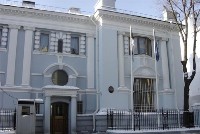Estonia reopens its embassy in Moscow
Estonia said it reopened its embassy in Moscow after a three-day stand-off between the Baltic country and Russia over the removal of a Soviet monument from central Tallinn.

The consular section of the embassy had been closed Wednesday after pro-Kremlin youth groups staged raucous protests that drew sharp criticism from the European Union and NATO.
"The consular services department is fully operational as of Friday morning as the embassy's security situation has sufficiently improved," Estonia's Foreign Ministry said.
The protesters left the embassy on Thursday, ending a virtual siege of the building that had threatened to fray Russia's already strained relations with the EU.
But hundreds of students marched to the EU's representative office in Moscow on Friday in the latest protest over the relocation of the memorial.
Russia has long accused the EU of failing to respond adequately to what it says is widespread discrimination against Russian-speaking minorities in Estonia.
During the protests, Estonia's flag was pulled down and rocks were thrown at windows. Diplomatic families who lived in the building were flown back to Tallinn, and Ambassador Marina Kaljurand suddenly left on vacation.
Estonia's Foreign Minister Urmas Paet said the Baltic country was monitoring the situation and again urged Russia to comply "completely" with the Vienna Convention concerning diplomatic premises and diplomats.
The dispute centered on Estonia's controversial removal on April 27 of the Bronze Soldier, a statue commemorating Red Army soldiers killed in World War II. It has also decided to move a nearby war grave from central Tallinn.
Estonia's ethnic Russians viewed the monument as a tribute to the Soviet victory over Nazi Germany, while Estonians regarded it as a symbol of Soviet repression and a half-century of occupation.
Violence broke out in Tallinn and one person was killed, more than 100 injured and some 1,100 detained.
Estonia's government moved the statue known as the Bronze Soldier to a military cemetery some 3 kilometers (2 miles) from its former location. The remains of the 12 Soviet Red Army soldiers found at the war grave of the original site of the statue will be reburied at the cemetery later.
Ethnic Russians are expected to turn out en masse at the cemetery next Wednesday when they commemorate the Soviet victory over Nazi Germany in World War II.
Subscribe to Pravda.Ru Telegram channel, Facebook, RSS!





